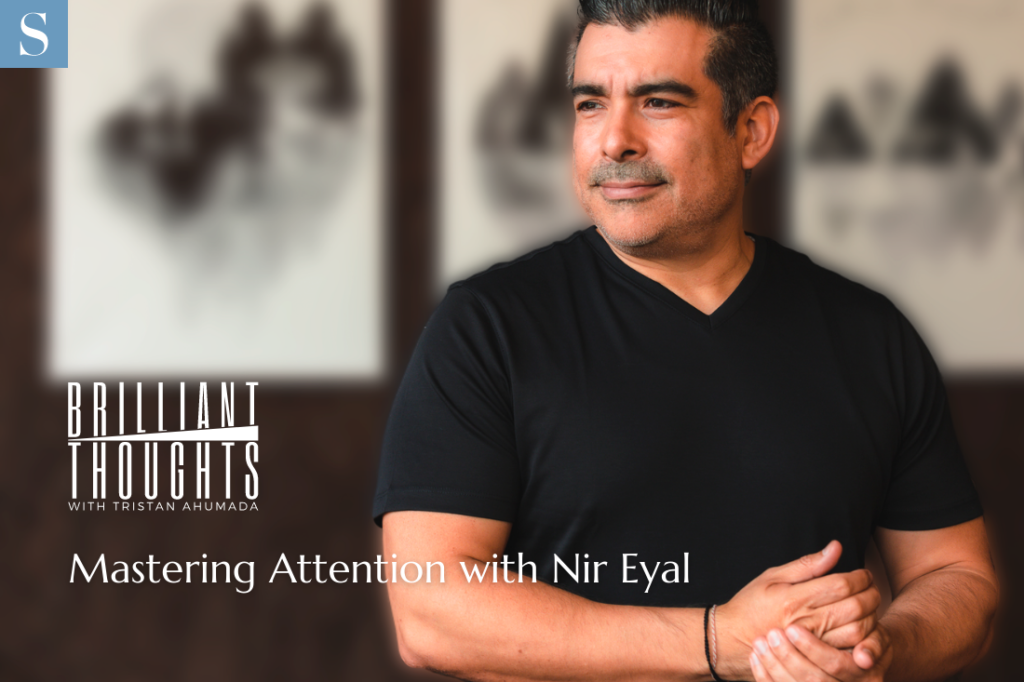Everyone wants to be more productive, but the typical advice for focusing and getting things done isn’t realistic. For example, a common tip people cling to is, “Put your phone down most of the day, even while having dinner and right before bed.” But it’s not that simple in this era of TikTokers, digital nomads and LinkedIn influencers. A smartphone, no matter how addictive, equals opportunity. People use them to make content, get brand deals, find a job and more.
With or without technology, there will always be distractions. The trick is knowing how to coexist with it all and still reach your goals.
Nir Eyal, author of Indistractable, says it all comes down to intent. Watching your favorite TV show or scrolling through Instagram is OK if those activities don’t disrupt your day.
“You can turn distraction into traction by making time for it,” Eyal says. “So if you have time for those things in your day, plan for [them] ahead of time. It’s traction. Enjoy it without guilt.”
In this episode of Brilliant Thoughts, Eyal shares three misconceptions about productivity with SUCCESS People Editor Tristan Ahumada. They redefine what it means to be distracted and how to overcome that annoying state.
1. Despite what many people think, distractions aren’t easy to spot.
Years ago, Eyal came to work with a clear goal in mind. He wanted to knock out the biggest tasks on his to-to list, especially those with immediate deadlines. So he sat down, skimmed the list and told himself to do the big tasks first.
What happened was the opposite. Somehow his mind tricked him into checking emails and scrolling a bunch of Slack channels. He thought, I’ll knock out the easy things so I feel like I’m working hard.
“What I didn’t realize by doing that, is that I was allowing distraction to trick me,” Eyal says. “I was doing the urgent and the easy work as opposed to the hard and important work that I had to do to move my life and career forward.”
These are covert distractions: activities that feel good but don’t make a real difference in the long run.
To get back on track, ask yourself which tasks make you feel accomplished at 5 p.m. Spoiler: Responding to 20 emails probably won’t make the cut. Most likely, you’ll feel grateful that a big, stressful project is in your rearview.
2. We mislabel the root cause of distraction.
Most people blame outside events for their daily cycle of distraction, Eyal says. It was a phone call from mom that derailed the day. It was an email with the subject line: URGENT. It was a coworker traipsing through the office to socialize or take a break.
“But it turns out, studies find that that’s only 10% of when we get distracted,” Eyal says.
The other 90% come from internal triggers, such as:
- Loneliness
- Fatigue
- Stress
- Anxiety
- Boredom
When you feel uneasy, you’ll do anything to escape that emotion. Addressing those internal triggers, such as why you feel stressed or bored, helps you avoid a mindless distraction. Instead of playing Candy Crush, maybe you just need to take a walk or request a work project that’s more stimulating.
3. You don’t make time for traction, so distraction takes over.
If you feel distracted most days, check your calendar to see what’s written there. What are you getting distracted from? If the answer is “nothing” (because you forgot to write some tasks for the day), it’s time to fill those empty spaces.
“If you don’t plan your time, somebody is going to plan it for you,” Eyal says. “There are too many interests out there between the commercial interests of the media or your boss or your kids. Somebody is going to take that time if you don’t decide for yourself how you’re going to spend it.”
But that doesn’t mean you should write a long to-do list. You need something that creates a natural boundary for your time–something that stops you from writing down any and every thing.
Eyal recommends a timebox calendar. It lets you assign one task to a fixed amount of time so you never overbook yourself.
“By making a timebox calendar, you are forcing yourself to make a trade-off,” Eyal says. “Do I want to spend time with my kids, or do I want to spend time on Facebook? Do I want to spend time working, or do I want to watch a game on TV?”
Distractions are irritating, but they aren’t inescapable events that trap us forever. Sometimes they’re a sign of something deeper, and we need more insight to discover what (or who) is disrupting the day.
Brilliant Thoughts with Tristan Ahumada is no longer releasing new episodes on the SUCCESS Podcast Network, but you can still listen to the full conversation below.





